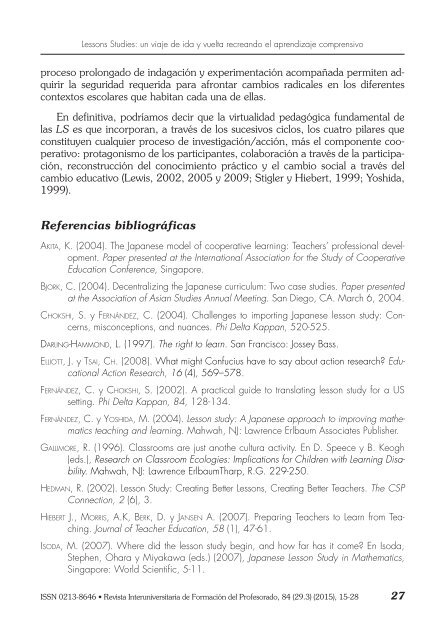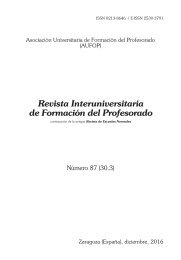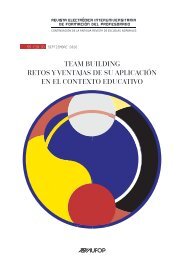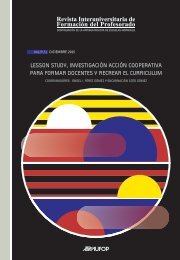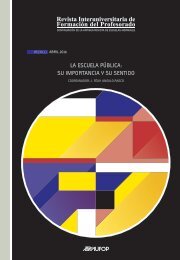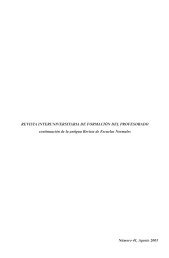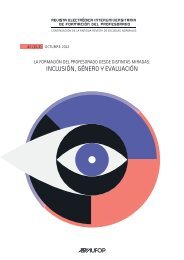PARA FORMAR DOCENTES Y RECREAR EL CURRICULUM
4qe5qrIwN
4qe5qrIwN
Create successful ePaper yourself
Turn your PDF publications into a flip-book with our unique Google optimized e-Paper software.
Lessons Studies: un viaje de ida y vuelta recreando el aprendizaje comprensivo<br />
proceso prolongado de indagación y experimentación acompañada permiten adquirir<br />
la seguridad requerida para afrontar cambios radicales en los diferentes<br />
contextos escolares que habitan cada una de ellas.<br />
En definitiva, podríamos decir que la virtualidad pedagógica fundamental de<br />
las LS es que incorporan, a través de los sucesivos ciclos, los cuatro pilares que<br />
constituyen cualquier proceso de investigación/acción, más el componente cooperativo:<br />
protagonismo de los participantes, colaboración a través de la participación,<br />
reconstrucción del conocimiento práctico y el cambio social a través del<br />
cambio educativo (Lewis, 2002, 2005 y 2009; Stigler y Hiebert, 1999; Yoshida,<br />
1999).<br />
Referencias bibliográficas<br />
Akita, K. (2004). The Japanese model of cooperative learning: Teachers’ professional development.<br />
Paper presented at the International Association for the Study of Cooperative<br />
Education Conference, Singapore.<br />
Bjork, C. (2004). Decentralizing the Japanese curriculum: Two case studies. Paper presented<br />
at the Association of Asian Studies Annual Meeting. San Diego, CA. March 6, 2004.<br />
Chokshi, S. y Fernández, C. (2004). Challenges to importing Japanese lesson study: Concerns,<br />
misconceptions, and nuances. Phi Delta Kappan, 520-525.<br />
Darling-Hammond, L. (1997). The right to learn. San Francisco: Jossey Bass.<br />
Elliott, J. y Tsai, Ch. (2008). What might Confucius have to say about action research? Educational<br />
Action Research, 16 (4), 569–578.<br />
Fernández, C. y Chokshi, S. (2002). A practical guide to translating lesson study for a US<br />
setting. Phi Delta Kappan, 84, 128-134.<br />
Fernández, C. y Yoshida, M. (2004). Lesson study: A Japanese approach to improving mathematics<br />
teaching and learning. Mahwah, NJ: Lawrence Erlbaum Associates Publisher.<br />
Gallimore, R. (1996). Classrooms are just anothe cultura activity. En D. Speece y B. Keogh<br />
(eds.), Research on Classroom Ecologies: Implications for Children with Learning Disability.<br />
Mahwah, NJ: Lawrence ErlbaumTharp, R.G. 229-250.<br />
Hedman, R. (2002). Lesson Study: Creating Better Lessons, Creating Better Teachers. The CSP<br />
Connection, 2 (6), 3.<br />
Hiebert J., Morris, A.K, Berk, D. y Jansen A. (2007). Preparing Teachers to Learn from Teaching.<br />
Journal of Teacher Education, 58 (1), 47-61.<br />
Isoda, M. (2007). Where did the lesson study begin, and how far has it come? En Isoda,<br />
Stephen, Ohara y Miyakawa (eds.) (2007), Japanese Lesson Study in Mathematics,<br />
Singapore: World Scientific, 5-11.<br />
ISSN 0213-8646 • Revista Interuniversitaria de Formación del Profesorado, 84 (29.3) (2015), 15-28 27


